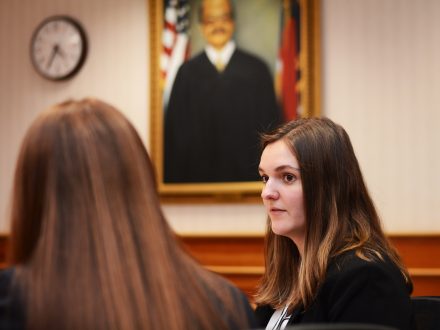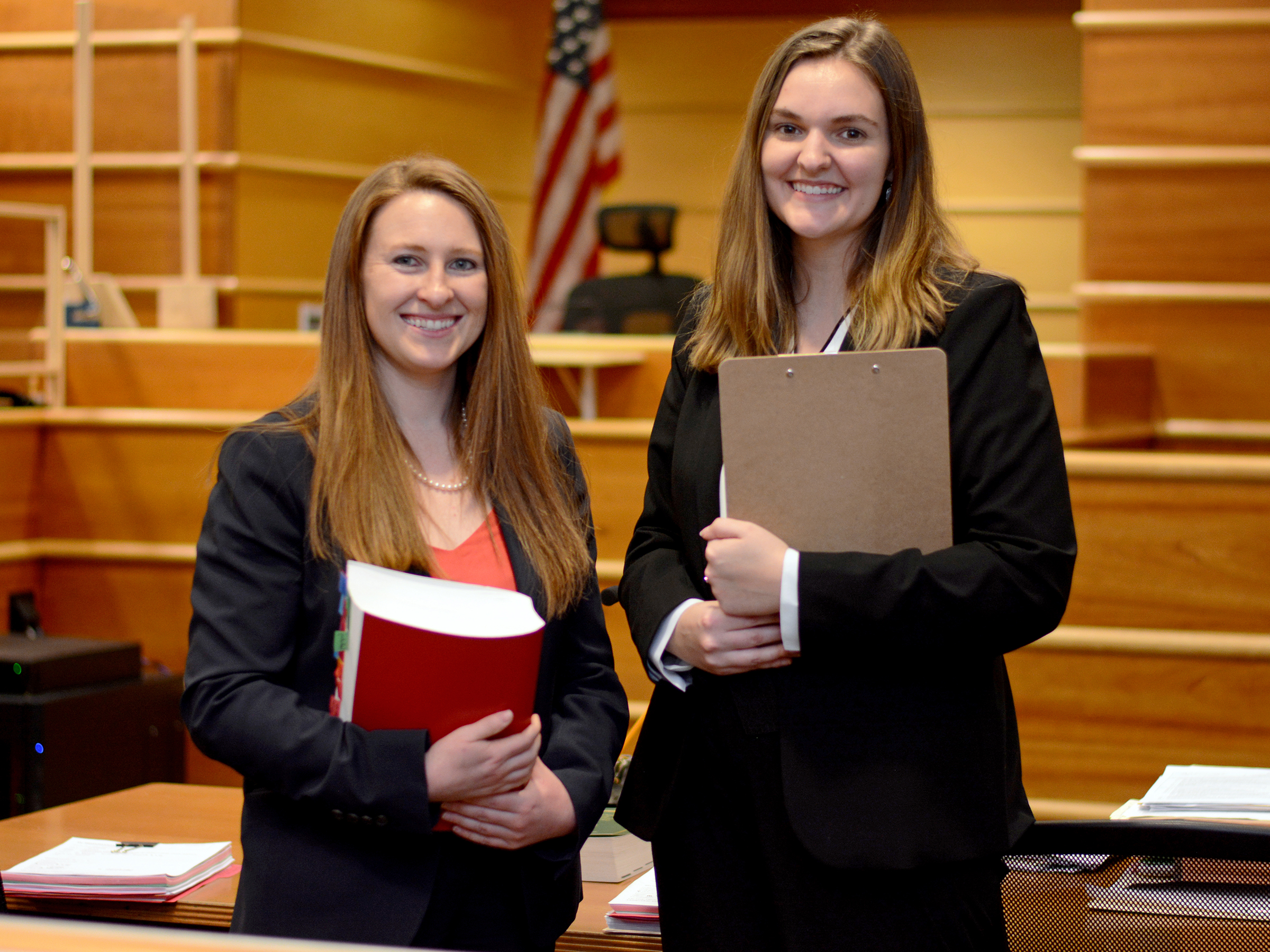An Elon Law residency-in-practice with criminal prosecutors in Winston-Salem, North Carolina, provided an opportunity for Alison “Ali” DeHoek L’22 to hone the ability to think quickly on her feet while better understanding the mechanics of North Carolina’s system of justice.
Ali DeHoek’s cousin is a foster mother and has been through “a lot” with the legal system and contentious custody battles. That’s what first inspired the Michigan native to pursue a legal education.
It didn’t take long once she enrolled at Elon Law for DeHoek to realize that other legal practice areas, in addition to family law, were also of interest. Criminal law topped that list.
Inspired by true crime reports she watched as a child on Dateline, coupled with coursework from Professor Steve Friedland, DeHoek set her sights on learning more about the criminal justice system.
DeHoek answered questions recently about her 2022 Winter Trimester residency-in-practice at the Forsyth County District Attorney’s Office under the guidance of Assistant District Attorney Alison Lester, and how her work may be of benefit as she joins her fiancé in Colorado after graduation.
This is the first in a series of conversations with Elon Law students in the Class of 2022 completing their residencies-in-practice throughout the winter and spring trimesters.
***
Tell us a little bit about your daily responsibilities at the DA’s office.
I would say that I’m mostly in court in the mornings and that could mean I’m sitting and observing, which I think has been incredibly beneficial. At first I thought I didn’t want to just sit here all day. I’m not going to get my hours for this! But that’s one of the best things I’ve done – sitting and watching other people. I’ve tried to go to different courtrooms and see different attorneys because everyone has their own style and way of doing things, which gives you a way to see what you prefer and what you’d want to do.
More recently, I’ve been running the docket if the day is short. I’ll call people up for continuances or first appearances. Surprisingly, I haven’t done a ton of research. I’ve spent most of my time in District Court and they don’t do a lot of written motions. My supervisor asked me if I wanted to help with a felony trial for obtaining property by false pretense and I was invited to take part in direct questioning for a handful of domestic violence trials.
Based on your experience, what’s surprised you the most about the practice of law?
You learn about the law in school, obviously, and you take Legal Method and Communication and Legal Research, which are great. But, for instance, if a defense attorney makes an argument in the courtroom and you’re asked if the state wants to be heard, you must get up instantly and make your case. Sometimes you don’t have time to review a full report before you do a plea or a trial, so you’re reading it as you go, which is stressful for a Type A person like myself, but it’s a skill you have to develop.
Which of your traits benefited you the most in your approach to this residency? You said you were Type A. How does that help you?
I told myself before I went into my residency that I would not be uptight, and if I wasn’t fully prepared for something, that was OK. If someone asked me if I wanted to do something, for the most part, I told myself I would say yes. The second day, one of the attorneys, an Elon alum, asked if I wanted to do a DWI plea. My first instinct was no because I didn’t know how it went! But then I told her, “Yeah, sure!” I got up and it was horrible. I kept leaning down to ask what I should say next. She was super helpful, and the judge was very patient. Once you do one, you’re set to go, you learn, you move on.

How has your time with the Forsyth County DA shaped your plans for after graduation?
I’ve really enjoyed my residency and can easily see myself doing some type of work in criminal law somewhere down the road, but I’m really open to just about anything. This residency has also helped me realize it’s just as much about the people you work with. That’s something I’ll look for, a feel for how the people get along. Here, it’s great. Everyone has been so helpful and so nice to each other.
Share one “quick tip” for current and prospective students as they prepare for their own Elon Law residencies or, more broadly, law school in general.
“Just do it.” Try to do as many different things as you can – if an attorney is going to a trial, ask if you can tag along, and if they’re going to meet with a cop, ask if you can go with her. There was a first-degree murder trial and I asked to sit in. I watched a whole week of a jury trial and some of the attorneys around here have said they’d never see one before. It’s all about asking to do things rather than waiting to be offered something.
I knew that I wanted to do something with either the DA’s office or a public defender’s office because I wanted courtroom experience. That’s another great thing with criminal law. You’re going to be in the courtroom and you’re going to learn how to speak in front of a judge and how courts operate. I recommend doing a residency where you’re going to be in a courtroom. I know that’s not for some people, and that’s OK, but it’s my recommendation.
About the Residency-in-Practice Program
Elon Law’s highly experiential 2.5-year curriculum requires every student to complete a full-time, course-connected residency-in-practice during their second year of study. Through faculty-directed residencies, students cultivate essential skills, values and judgment to help them excel as attorneys and deepen their understanding of various practice areas, while enabling attorneys to convey wisdom about the legal profession.
Students work 32-36 hours a week over a 10-week trimester with a judge or attorney supervisor and a faculty member to create and implement a learning plan that develops an increased proficiency in professional legal skills and in an area of law practice.



